Minecraft… err, mainkurafuto マインクラフト! Of course, I think almost everyone knows the game. Either you've played it, someone you know won't shut up about it, or you've heard of it through popular culture / the media. To me, I've always thought of it as the incredibly addicting, fun, and educational game that I don't mind seeing kids playing (darn kids and their CoD). The deeper you get into Minecraft the more educational it gets, really!
But, couldn't the "educational" aspect of Minecraft be taken a step further? I thought exactly this during a month-long binge of Minecraft I had in 2012. Playing on various servers, you would meet people from other countries, Japan included. Mostly, I would see people trying to explain or ask things in the English language. Sure, we were mostly talking about diamonds, pick axes, and survival, but the grammar and the need to communicate was all being learned.
The game itself is simple, it encourages teamwork (or lots of fighting and whining), and communication is fairly realistic, all things considered. You have to talk in the past tense, the present tense, and the future tense. Also, you have to explain directions, where things are, what things are there, and so on. It's a real (virtual) world, after all! Plus, the game is extremely simple to play at first, and builds very gradually to the more complicated, which is similar to how languages are learned. Unlike virtual worlds such as Second Life and MMOs, Minecraft has a very pleasant learning curve that's almost perfect to learn a language alongside it.
That brings me to James York, English teacher at a Japanese university and PhD student researching language learning in virtual worlds. He has actually built a Japanese class around Minecraft, teaching several classes a year up to the JLPT5 level (at least for right now). Just from seeing how Minecraft encourages language learning from my experience "in the wild" I was really interested to find out how Minecraft could help someone's language learning in a slightly more organized "class". So, I interviewed York-Sensei to learn more about how he's trying to improve how Japanese can be learned.
Q. What's Your Story?

I learnt a lot of Japanese when I joined a Japanese WoW guild back in 2006 and since then have been interested in games/virtual communities as language learning domains. I teach English as an assistant professor at a university in Japan and am also a PhD student researching how spoken language proficiency can best be promoted with virtual worlds. So lets just say Kotoba Miners (editor note: that's what he's calling his in-Minecraft Japanese class) is my hobby, but also my job, and will hopefully help me get a PhD.
I started the server originally as a LAN-based server where my Japanese university students could learn/practice English. Then I asked over on Reddit if I could bring my students to their server and if anybody would like to help them learn. The response was really promising and one very generous redactor offered to give me a server with his hosting company to make my own server. Of course I accepted and so became "Mining English" as it was originally called. So, we had Japanese university students learning English with some native English speakers on my own server. Then, the course finished and all the students stopped playing. What I was left with was a server with a bunch of English speakers eager to learn Japanese. It was at this point that the original objective of the server to teach English flipped to learning Japanese.
Q. What were your key takeaways from doing "Mining English"?
That you can't force people to learn.
Students are sneaky :P (By this I mean that they will often do the bare minimum or cheat. For example, I gave them the task of interviewing a native English speaker on the server, but they actually ended up interviewing each other and then handing that in (haha). I wouldn't have known unless one of the native English speakers happened to be online at that time and saw them do it.)
Task goals designed by teachers are often misconstrued into something completely different from what students actually do, but we have to roll with that and adapt on the spot.
Slightly negative: The Japanese don't want to learn English (sweeping statement I know, but true… At least in a structured, Minecraft-based course). I opened the server up to the Japanese Minecraft forums and had very little response. It's a shame, but I'm glad we became Kotoba Miners. I really enjoy teaching people that are eager to learn!
Q. So why Minecraft?
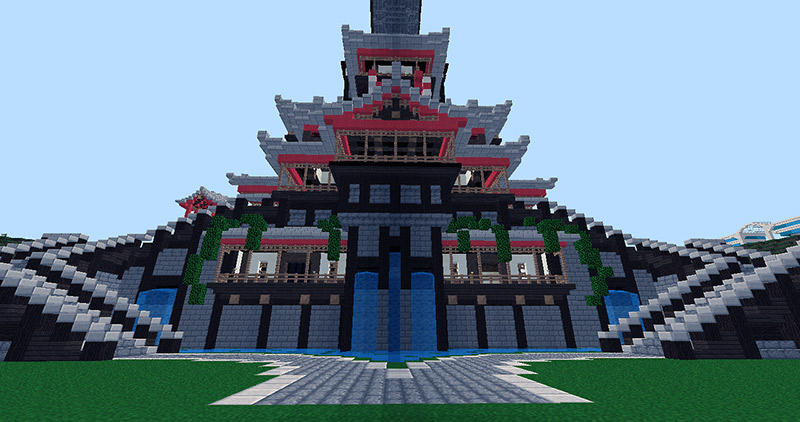
I experimented with a number of virtual worlds and games as part of my research. I rejected MMOs for lack of control over content and their often extremely specialized discourse (e.g. "Prot Warrior LFG SFK pst"). I also rejected a lot of social worlds (i.e. Second Life) for their painful aesthetics, controls and distance between user and content-creator.
Minecraft is simple. Controls, aesthetics, and gameplay. This means that you spend less time learning how to navigate the game and more time learning and focusing on language.
Q. How is your classroom in Minecraft set up? How does a typical class work?
Class topics loosely follow the Genki textbook in terms of progression and the overall objective of the class is to get students to a JLPT N5 level.
The overall objective of the class is to get students to a JLPT N5 level. Lesson content is stored on the server in the "JP buildings" JP1 – JP10.
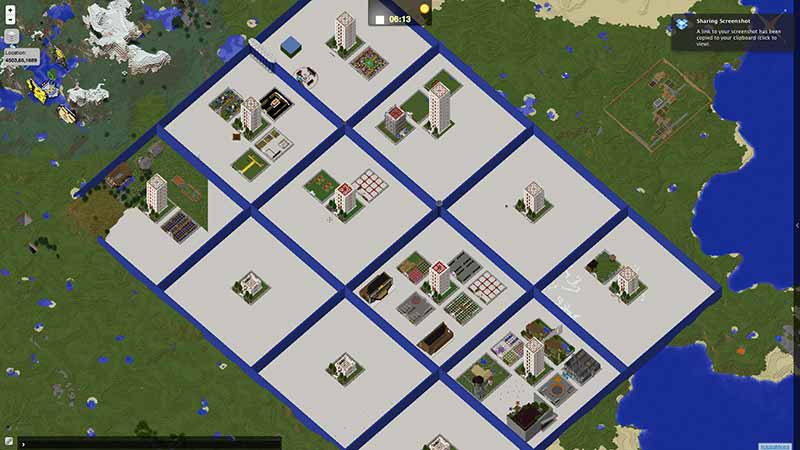
Activities related to the lessons in each building can be found around the building itself:
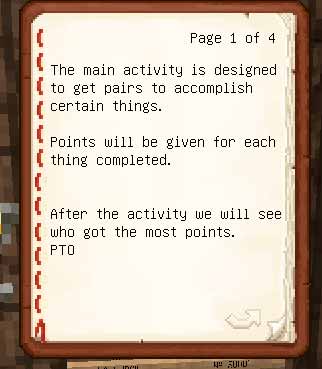
Classes are not lectures and students speak and interact with others for the majority of class time. Speaking is achieved with the use of TeamSpeak where we all log into the Kotoba Miners server. If you are to join the class you should expect the following as a typical class:
- Start with a review exercise to refresh our memories of previous lessons content (an activity from another JP building).
- Brainstorm vocabulary.
- Sometimes I explain a new grammar point, but then other times, students go and Google it and share what they found (student-centered learning).
- The next main activity is designed to make use of the new grammar point, but also requires the use of grammar/vocabulary that we have covered in the past also.
- After class, there is sometimes homework (such as to create a similar activity for others to complete the following week) and I provide practice exercises via our LMS (learning management system): languagecloud.co.
Q. What kind of lessons have you created that are unique to the Minecraft interface?
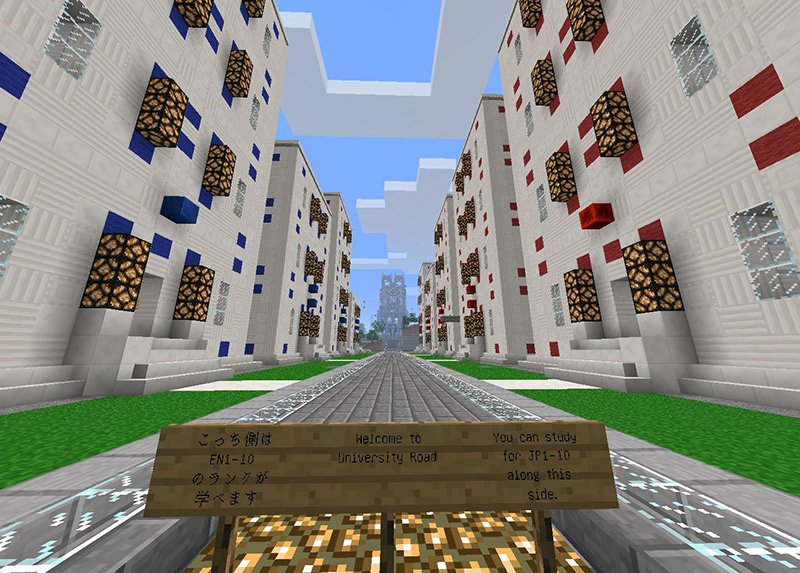
We do a couple of lessons where students have to play Minecraft in survival for 2 full Minecraft days. They have a number of objectives to complete.
The objectives are given to them in a book. These objectives are pretty specific to Minecraft.
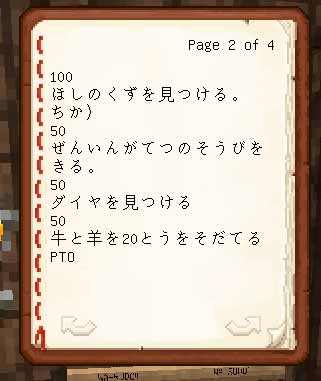
Once the two days are over, pairs get together and compare their experiences over the two days. This is obviously used to practice the past tense in affirmative and negative forms. An example of a conversation might go something like this:
A: 畑は作った?
B: 作らなかった。ダイヤは見つけた?
A: 見つけた!そっちは?
B: 見つけなかったorz
A: あまりできなかったねw
So, you're doing things and you're talking about them afterwards. In a regular Japanese classroom you don't really have these kinds of shared experiences that you can talk about. But, thanks to Minecraft we can do this. In addition to this we can speak WHILE doing them. Doing the activity itself requires the use of language.
A good example is the "Ice Palace" which is set up so that you cannot clear it unless you communicate with your partner. Here is a screenshot of one of the rooms:
This side has the route to tell your partner:
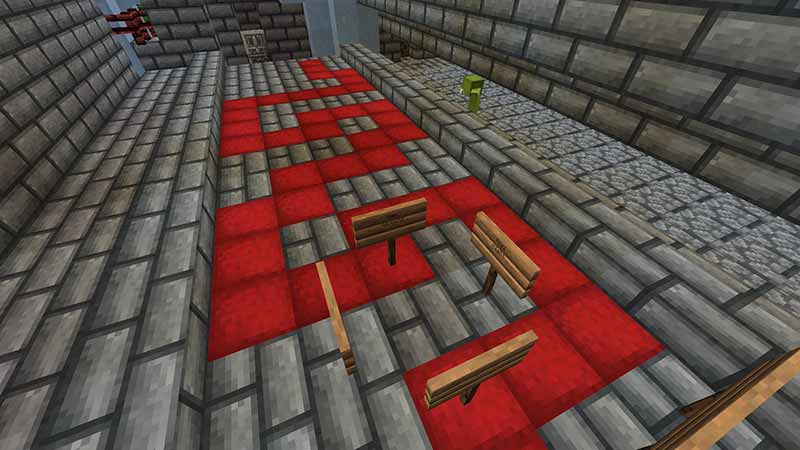
This side is a row of pressure plates that need to be navigated correctly. If you don't pistons push the blocks at the top and crush the player.
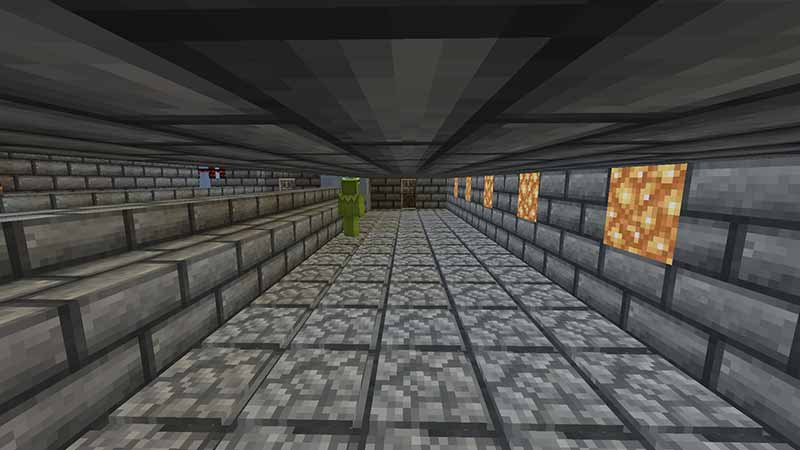
Q. What advantages does Minecraft hold over a real world classroom?
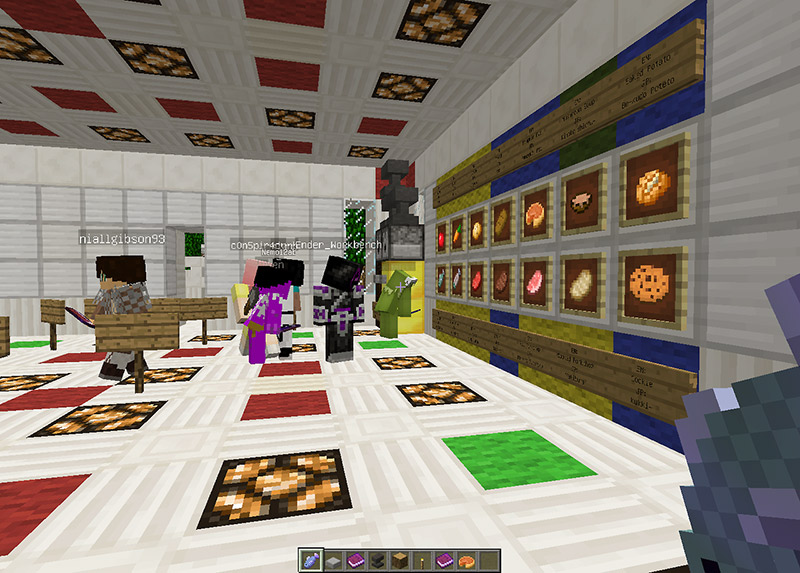
Learning by dying. Simply put – games offer feedback loops that show/punish you when you do something wrong. And people are more likely to take risks and get things wrong when playing a game than they are in a classroom.
However, the biggest advantage for Kotoba Miners is the fact that people can log in from all around the world at the same time and connect with other Japanese learners and actually practice SPEAKING the language. The majority of students that come to Kotoba Miners that have been studying Japanese in the past invariably say something along the lines of: "I've been studying Japanese for a while, but I've never actually spoken it…" So I think the lessons we do on Kotoba Miners are a great place to improve your Japanese speaking and listening ability. (as an aside: these skills are generally not looked at as much as reading and writing in the literature on virtual worlds and language learning, and this is why I'm pushing them in my own research).
Q. What's your language learning philosophy?
-
(Specifically for Japanese) Get the Kanji out the way early on. If you are serious about learning the language, and aiming for a high level of proficiency 6 months to 1 year is not a long time to spend on learning Kanji.
-
Use and SRS. RtK aside, Anki was the most useful tool I had when actively studying Japanese. Not just for vocabulary, but grammar, and even things like famous peoples' faces, and famous dates etc. Extremely important.
-
Speak, make mistakes and learn. I (very fortunately) was able to learn Japanese while living in Japan. But it didn't come without an almost uncountable amount of 恥ずかしい moments when I messed up. There is nothing more embarrassing than being told by a 6 year old kid 「なに?日本語変だよ」(What? Your Japanese is strange) but it makes you god damn certain that you will never make that particular mistake again. A famous point on mistakes is that you can do one of two things: speak or not speak. If you speak you get a result "I was correct" or "I was incorrect;" but if you don't speak, you will never know if you are correct or not, and therefore never actually learn or progress. Get out there and mess up!
-
Read. Can't understand what they are saying in anime? Start with books. Books should not be overlooked. I started with stories aimed at 小4−5 level (elementary grade 4 and 5) and learned an absolute metric cuss ton of useful language. Especially onomatopoeia which is so important in Japanese.
Q. How does the community outside of the Minecraft game enhance the Japanese language learning experience?
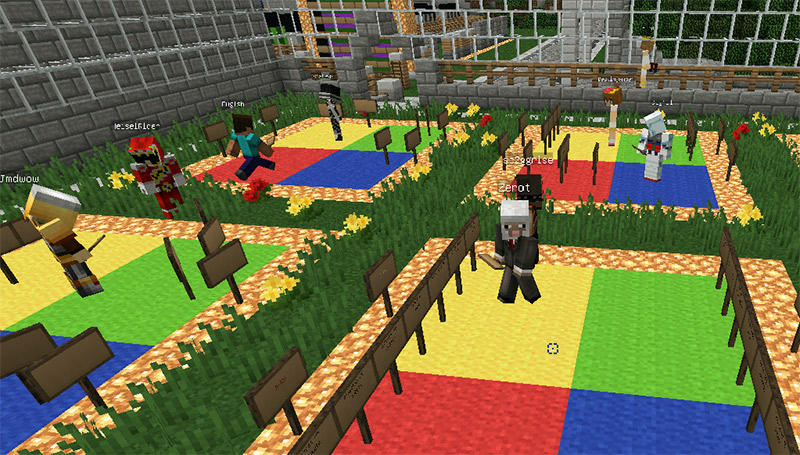
I'll let my students answer this one:
Kotoba Miners the community enhances the language learning experience in every way, and I honestly can't think of a better resource. Most of all for me is that it keeps me motivated, and I can say for sure I wouldn't still be studying Japanese if I didn't come across Kotoba. The way it does this I think is that the topic within the community is always language learning, but the specific activities we do may be things that we just enjoy. Naturally the Japanese learning leaks in to what we're doing, but it doesn't feel like I'm burning out on the learning aspect, rather than just enjoying it and getting immersed. For example I love video games; I grew up as a gamer. Within Kotoba I have found friends to game with, on games like Garry's Mod, League of legends, Osu and more. Since we're learning Japanese, even though we're not focusing on it, you can bet a friend will show off some new word or grammar he learned, which will naturally make everyone want to know what it means. Then there is the social aspect, I have people from class as friends now (one of the main reason I got into the language I guess). There are constantly conversations going on within Teamspeak, IRC, the app "Line" on my phone, all in Japanese.
The community has Japanese natives also, so with all this combined it's hard to get away from the language, I'm virtually immersed so to speak. The thing is, I'm just being social, it's fun, but I have to learn Japanese if I want to be even better at participating in these conversations, which I want to do. A few weeks ago I even met Cheapsh0t, and a few other guys interested in the Japanese culture. I learned so many interesting things about Japan and got some nice manga just from being involved with Kotoba.
Then there is my imagined rivalry with other students within the community. When I see that they just held a conversation with a native speaker better than I would of, it makes my blood boil. How dare he be progressing quicker than me? You can bet that's motivated me for the night until I think I could have done what I've just seen my friend do. It's nice to be able to compare myself to others and make sure I'm not slacking. So the community is fun, sociable, and I use it to benchmark my progress, keeping me motivated to keep learn the language.
Let me touch on what I see on /r/learnjapanese lately, which is output. Quite a few of these people are like "output is important, but how do I do it?". Then things like reading books, news, listening to podcasts, writing journals on lang-8, watching drama's etc. are all suggested. This is literally, so easy without effort in Kotoba. Podcasts? I can talk to natives or friends and get my listening comprehension and speaking practice. Books? I could open up Line on my phone now and find a whole conversation to read. Grammar? "Hey mate, I didn't quite understand what this bit meant, can you explain it?" I would ask, rather than searching it up and taking longer than I'd like. Writing journals? Well, I do this on the Kotoba forums, the forums are my favorite part (I can rikaichan everything!).
Honestly I used to use Genki textbook, Japanesepod101, Tae Kim's Grammar Guide and all that cool stuff. However, I've substituted all those for Kotoba, I really think it helps me more and is way more fun. I think Kotoba's only downfall as a community when it comes to enhancing my language learning is learning kanji, which I use WaniKani for. Besides that, it's the perfect resource with immersion second to only actually living in Japan.
Q. What are your plans for the future of Kotoba Miners?
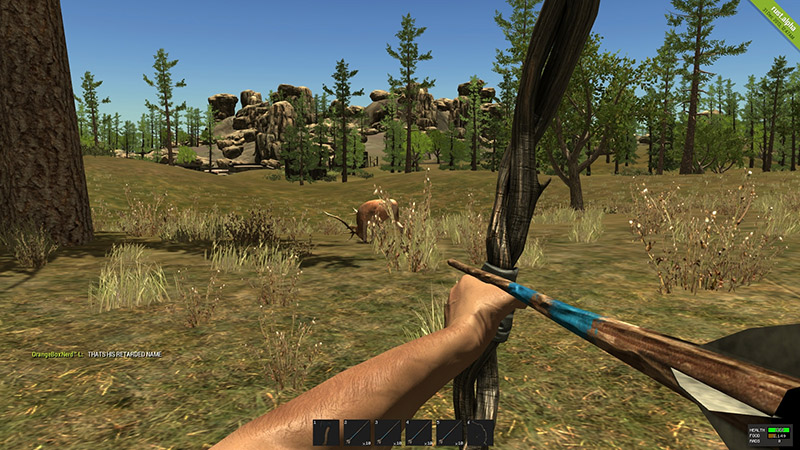
One thing that I haven't been spending too much time on is how to study kanji. I personally went the Remembering the Kanji route, and a lot of my current students are using WaniKani, so although it is probably not needed, I'd still like to figure out a way to teach kanji in the Kotoba Miner's world (James goes on to say that the blocky graphics make this particularly difficult).
Another thing I am focusing on is branching out into other games with our Saturday "Let's Play" series where we play games in Japanese. We've mainly focused on Minecraft up until now, but we've got Rust, LoL, and DarkRP coming up, as well as suggestions from current students.
Finally, I think the Kotoba Miners model is usable for other languages, so if any readers would like to use it to teach another language, get in touch!
Q. How can people sign up for your Japanese classes?
We will be starting a new run of our course for EU students at the start of June. You will need a Minecraft account of course. I wrote a guide about signing up.
Currently, classes are Tuesday 11:00 AM and 9:00 PM (JST).
